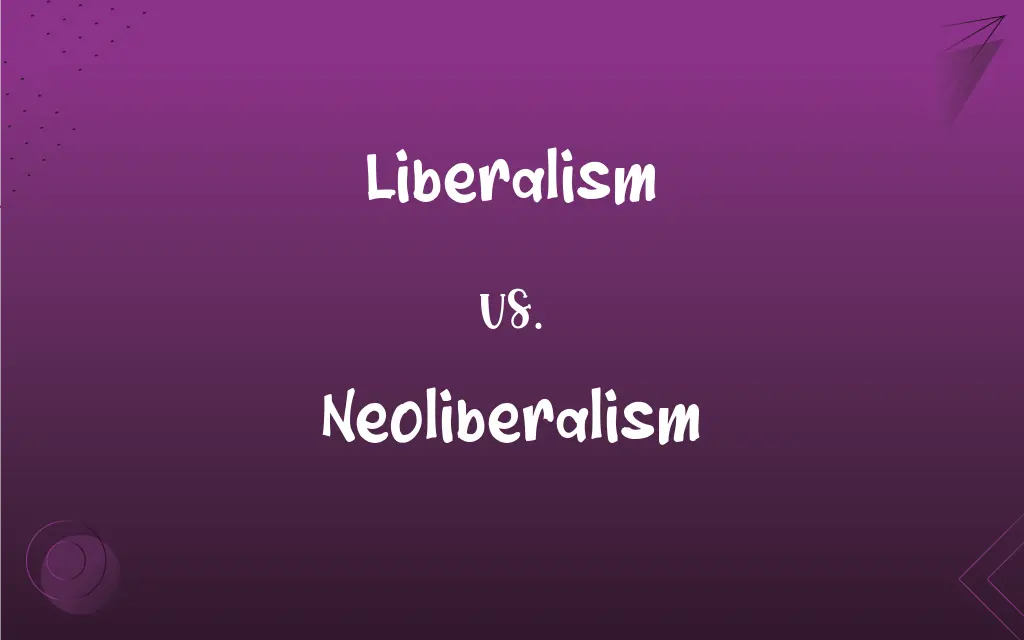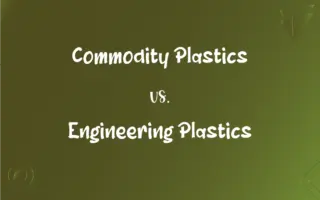Liberalism vs. Neoliberalism: What's the Difference?
Edited by Aimie Carlson || By Harlon Moss || Published on December 7, 2023
Liberalism emphasizes individual freedoms and equality, while neoliberalism focuses on free-market capitalism and reducing government intervention.

Key Differences
Liberalism is a political and moral philosophy based on liberty, consent of the governed, and equality before the law. Neoliberalism, a more recent development, refers to a political-economic philosophy that extends the values of liberalism to free-market capitalism, advocating for minimal state intervention in economic affairs.
In liberalism, the focus is on protecting individual rights and ensuring a level playing field for all. Neoliberalism, on the other hand, emphasizes the efficiency of the free market, often at the expense of social welfare programs and labor protections.
Liberalism advocates for a democratic government to safeguard individual rights, while neoliberalism often promotes privatization, deregulation, and a reduced role for the state in economic matters.
Historically, liberalism arose from the need to limit the powers of the state and protect individual freedoms. Neoliberalism, evolving from these principles, tends to prioritize economic freedoms, sometimes overshadowing social and political liberties.
Liberalism encompasses a broader range of social and political ideas, including civil rights and social justice. Neoliberalism, though drawing from liberal ideas, is more narrowly focused on economic policies and free-market principles.
ADVERTISEMENT
Comparison Chart
Core Philosophy
Emphasizes individual freedoms and social equality
Focuses on free-market capitalism and reduced government intervention
Economic Policy
May support government intervention for equality
Advocates for deregulation and privatization
Role of Government
To protect individual rights and provide welfare
Limited, mainly to support free-market operations
Historical Origin
Emerged in the Age of Enlightenment
Developed in the late 20th century
Social Welfare
Supports state-provided welfare programs
Prefers minimal state involvement in social welfare
ADVERTISEMENT
Liberalism and Neoliberalism Definitions
Liberalism
A political ideology valuing individual freedom and equality.
The right to free speech is a cornerstone of liberalism.
Neoliberalism
A philosophy endorsing individual entrepreneurial freedoms.
Neoliberalism values the role of private enterprise in driving innovation.
Liberalism
A perspective favoring a mixed economy with both private enterprise and government intervention.
In a liberal society, the government often provides essential services like healthcare.
Neoliberalism
An ideology promoting global trade and open markets.
Neoliberalism encourages international trade agreements to foster economic growth.
Liberalism
A philosophy advocating for democratic governance and civil liberties.
Liberalism supports the fair and equal treatment of all citizens under the law.
Neoliberalism
A political approach emphasizing deregulation, privatization, and a free market.
Under neoliberalism, the government minimizes its role in economic regulation.
Liberalism
A belief in the importance of individual rights and private property.
Liberalism upholds the right to own property without undue government interference.
Neoliberalism
An economic policy favoring free-market capitalism and reduced state intervention.
Neoliberalism advocates for privatizing previously state-run industries.
Liberalism
A tradition emphasizing the moral worth and autonomy of individuals.
Liberalism champions the idea that everyone should have the opportunity to succeed.
Neoliberalism
A perspective focusing on economic efficiency and market-led growth.
Neoliberal policies often prioritize economic growth over social welfare programs.
Liberalism
The state or quality of being liberal.
Neoliberalism
A political theory of the late 1900s holding that personal liberty is maximized by limiting government interference in the operation of free markets.
Liberalism
A political theory founded on the natural goodness of humans and the autonomy of the individual and favoring civil and political liberties, government by law with the consent of the governed, and protection from arbitrary authority.
Neoliberalism
A political ideology or ideological trend based on neoclassical economics that espouses economic liberalism, favouring trade liberalisation, financial deregulation, a small government, privatisation and liberalisation of government businesses, passive antitrust enforcement, accepting greater economic inequality and disfavouring unionisation.
Liberalism
Often Liberalism The tenets or policies of a Liberal party.
Neoliberalism
(US) The ideology associated with the New Democrats and the Democratic Leadership Council.
Liberalism
An economic theory in favor of laissez-faire, the free market, and the gold standard.
Neoliberalism
A political orientation originating in the 1960s, blending liberal political views with an emphasis on economic growth.
Liberalism
A 19th-century Protestant movement that favored free intellectual inquiry, stressed the ethical and humanitarian content of Christianity, and de-emphasized dogmatic theology.
Neoliberalism
A political orientation originating in the 1960s; blends liberal political views with an emphasis on economic growth
Liberalism
A 19th-century Roman Catholic movement that favored political democracy and ecclesiastical reform but was theologically orthodox.
Liberalism
The quality of being liberal.
Liberalism
(politics) Any political movement founded on the autonomy and personal freedom of the individual, progress and reform, and government by law with the consent of the governed.
Liberalism
(economics) An economic ideology in favour of laissez faire and the free market (related to economic liberalism).
Liberalism
Liberal principles; the principles and methods of the liberals in politics or religion; specifically, the principles of the Liberal party.
Liberalism
A political orientation that favors progress and reform
Liberalism
An economic theory advocating free competition and a self-regulating market and the gold standard
FAQs
Does liberalism support government intervention?
Classical liberalism advocates for limited government intervention, while social liberalism supports more government role in reducing inequality.
How does liberalism view individual rights?
It places a high importance on individual rights and freedoms.
What is liberalism?
Liberalism is a political and moral philosophy based on liberty, consent of the governed, and equality before the law.
How does neoliberalism differ from classical liberalism?
While rooted in classical liberalism, neoliberalism places more emphasis on free-market capitalism and deregulation.
What are the key principles of liberalism?
Key principles include freedom of speech, the rule of law, individual rights, and a free market economy.
Can liberalism be economically conservative?
Yes, especially in its classical form, which emphasizes free markets and limited government spending.
Where did liberalism originate?
Liberalism originated in Europe during the 17th and 18th centuries, paralleling the Age of Enlightenment.
Is liberalism the same as democracy?
Not exactly. While many liberal societies are democratic, liberalism is a broader philosophy encompassing various aspects of governance and society.
Does liberalism support social welfare?
Social liberalism does, advocating for welfare measures to address inequality.
What is neoliberalism?
Neoliberalism is a policy model that emphasizes the value of free market competition, with minimal state intervention.
When did neoliberalism emerge?
It gained prominence in the late 20th century, particularly in the 1970s and 1980s.
Is neoliberalism a universally accepted model?
No, it remains a contentious and debated model in economics and politics.
Is liberalism still relevant today?
Yes, as it continues to influence political systems and debates worldwide.
What are neoliberalism's main economic policies?
Key policies include deregulation, privatization, free trade, and reducing government spending.
What is the criticism of neoliberalism?
Critics argue it leads to increased inequality, reduced social services, and environmental degradation.
Can neoliberalism coexist with democracy?
Yes, but tensions can arise between its market-centric policies and democratic social goals.
How has liberalism evolved over time?
It has evolved from classical liberalism focusing on limited government to include social liberalism, which accepts a larger role for the state.
Does neoliberalism support social welfare programs?
Generally, it advocates for reduced government spending on social welfare.
How has neoliberalism impacted globalization?
It has been a driving force behind globalization, promoting international trade and open markets.
Has neoliberalism been successful?
Opinions vary. Some credit it with economic growth and increased global trade, while others highlight negative social impacts.
About Author
Written by
Harlon MossHarlon is a seasoned quality moderator and accomplished content writer for Difference Wiki. An alumnus of the prestigious University of California, he earned his degree in Computer Science. Leveraging his academic background, Harlon brings a meticulous and informed perspective to his work, ensuring content accuracy and excellence.
Edited by
Aimie CarlsonAimie Carlson, holding a master's degree in English literature, is a fervent English language enthusiast. She lends her writing talents to Difference Wiki, a prominent website that specializes in comparisons, offering readers insightful analyses that both captivate and inform.






































































